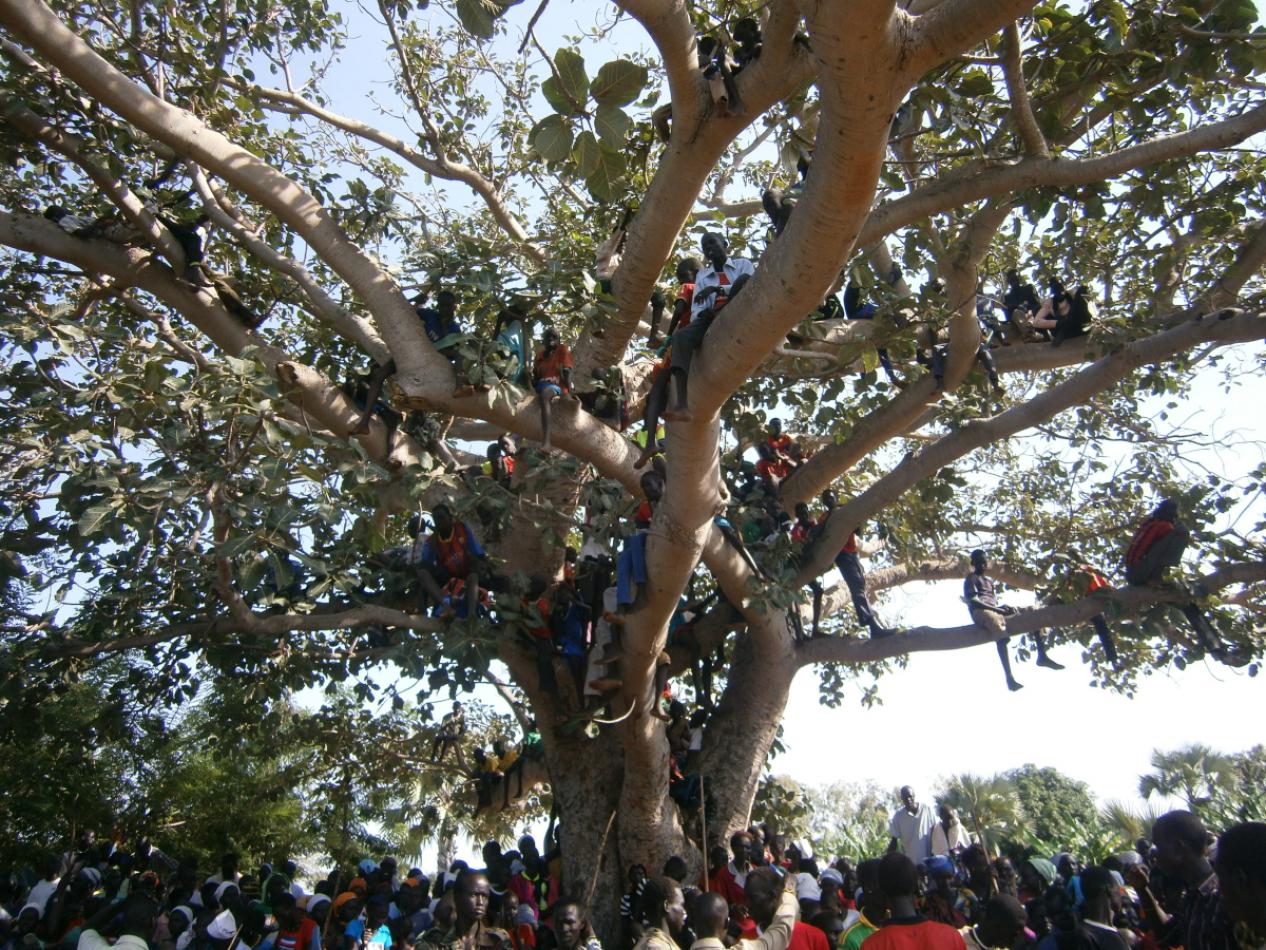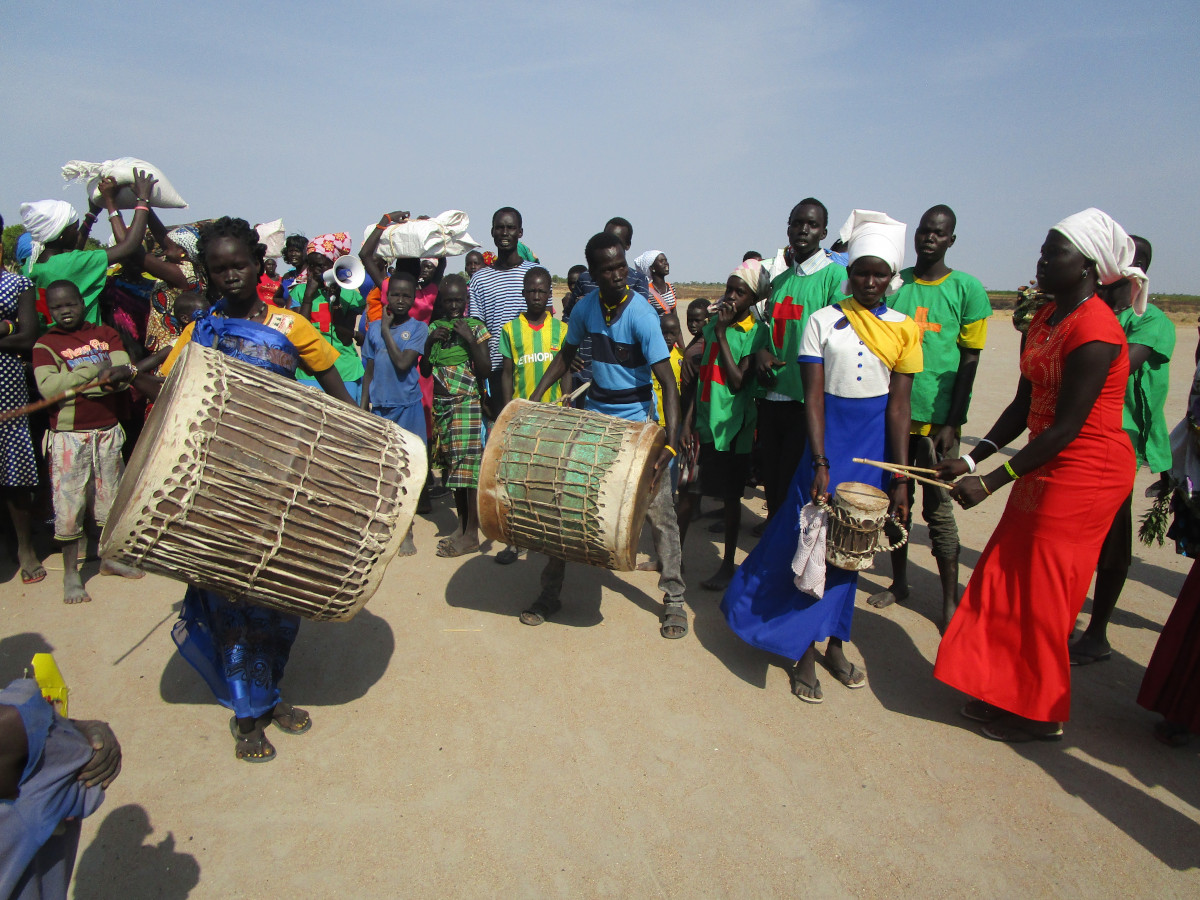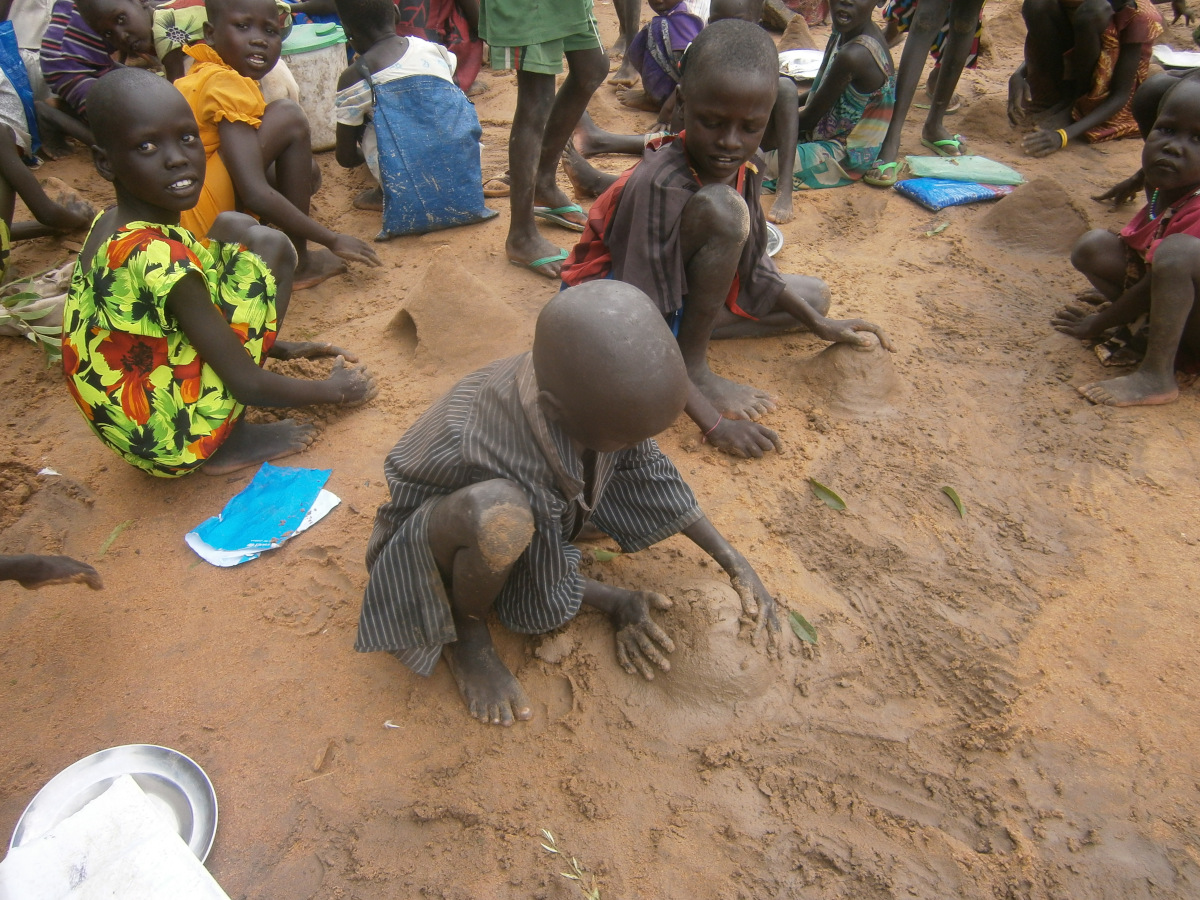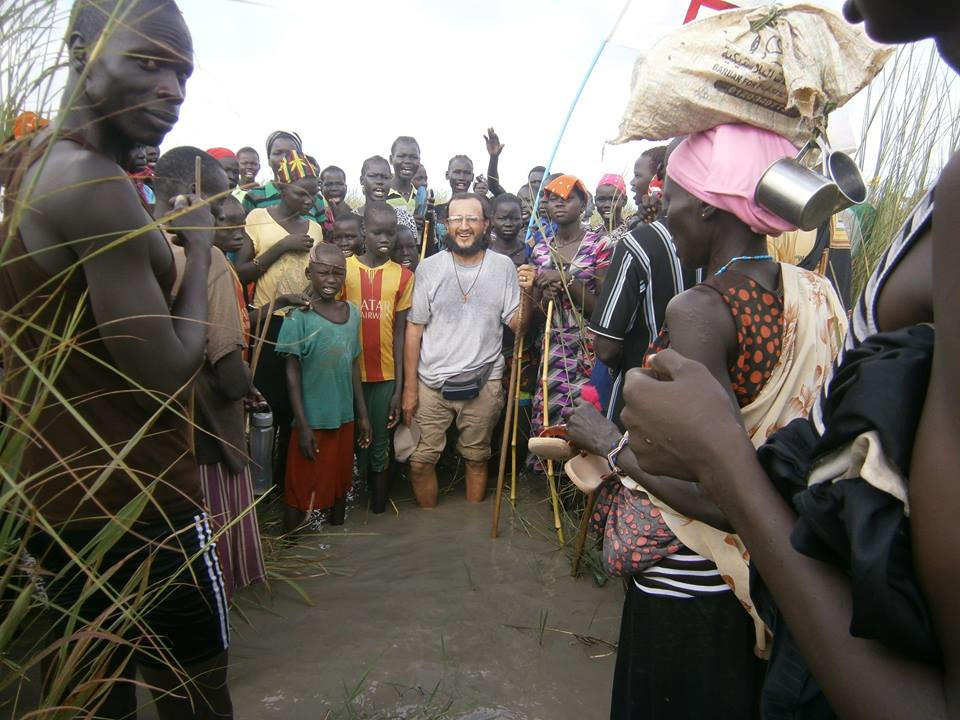Daniel Comboni
Comboni Missionaries
Institutional area
Other links
Newsletter
Saturday, September 18, 2021
The colour green has been, for several decades, the symbol or banner of environmental groups fighting for the protection of the environment. The green of the forests, the jungles where animals and humans live, which due to the phenomena caused by climate change are negatively affected in a profound way. Environmental groups seek to stop this ecological decomposition so that we have a liveable world where we can live well and pass it on to the next generations. (…)
SEE
Comboni missionaries’ experience: Integral Ecology and Mission among the Nuer in South Sudan.
The colour green has been, for several decades, the symbol or banner of environmental groups fighting for the protection of the environment. The green of the forests, the jungles where animals and humans live, which due to the phenomena caused by climate change are negatively affected in a profound way. Environmental groups seek to stop this ecological decomposition so that we have a liveable world where we can live well and pass it on to the next generations. But they say little about the injustices and human rights violations of certain affected communities, such as land dispossession and forced displacement due to logging or oil extraction.
Pope Francis, with the Apostolic Exhortation “Laudato Si” (2015), introduced a new concept of ecology, a broader vision of the ecological problem and ways to overcome it. He points out that everything is intimately connected, and we are all part of the same ecosystem. " When we speak of the “environment”, what we really mean is a relationship existing between nature and the society which lives in it. Nature cannot be regarded as something separate from ourselves or as a mere setting in which we live. We are part of nature, included in it and thus in constant interaction with it” (LS, 139), therefore "we are faced not with two separate crises, one environmental and the other social, but rather with one complex crisis which is both social and environmental. Strategies for a solution demand an integrated approach to combating poverty, restoring dignity to the excluded, and at the same time protecting nature" (Laudato Si, 139). Pope Francis' integral vision of ecology has all the colours of creation.
With the old vision of ecology, ecological issues seemingly have nothing to do with mission, but with Pope Francis' vision of an integral ecology in which everything is connected, ecological issues are deeply related to the life of all peoples, even the most isolated or least developed. Even more so in a situation of isolation that many human groups live in Africa or other parts of the world, one might think that ecological issues are not important because they live a simple lifestyle and without so much modern technology, which does not produce polluting or harmful gases for the environment, that there are other issues and needs that are more urgent. One example is the Nuer people who live on the two banks of the Nile River (east and west) in South Sudan. An area that is difficult to access because they live in a swampy region (320 kilometres wide and 420 kilometres long) where there are no paved roads or highways. They are pastoralists. However, even in the most isolated situations, it is possible to make a mission and work for an integral ecology. Two examples can help us understand this relationship, a modern one: plastic and an ancient one: violence.
Just as we speak of an integral ecology, we can also speak of an integral mission. This is reflected very well in the Apostolic Exhortation Dear Amazonia, which is structured in four dreams: social, cultural, ecological, and ecclesial. Integral ecology must be part of an integral mission. This statement should not surprise us because Catholic mission has always worked for integral human development and well-being. The seven Laudato Si objectives for integral ecological conversion can be very well integrated into educational, pastoral, and human development plans and projects of the mission. They are: Response to the Cry of the Earth, Response to the Cry of the Poor, Ecological Economics, Adoption of Sustainable Lifestyles, Ecological Education, Ecological Spirituality and Community Engagement and Participatory Action.
Plastic bottles and bags. It is surprising that plastic bottles, plastic bags and some other products made from these materials reach even the most isolated places in the world. Even though South Sudan has a law banning the use of plastic bags (2015) and the isolation in which the Nuer people live, plastic bags continue to arrive in the markets along with so many products packed in plastic bottles. In addition, there is no public rubbish collection service. Among the Nuer, when the house is cleaned, the rubbish is thrown outside the house at a considerable distance. If there are plastics, the wind and rains carry them to the rivers, lakes, and swamps, or to the fields where cows graze. In addition, many people who travel through the Nile River and the swamps throw all their rubbish into the water; in the lower parts of the swamps and rivers, all kinds of plastics can be seen embedded in the flora and fauna. There are no studies on the effect these plastics are having, especially on the animals in the water or on the cattle. There are cases of cows getting sick from eating plastic bags. However, if plastics continue to accumulate, they could endanger two of the fundamental activities of the Nuer people's life, culture, and economy: livestock farming and fishing.
Here the Church can do much to promote an integral ecology that protects the environment and the activities that give the people their cultural, social, economic, and religious identity and livelihood. This can be done through two Catholic institutions: the school and the parish, or through two missionary activities: education and pastoral ministry. The plans and objectives of both can include educational processes that form people with an integral ecological mentality, who are aware of how their actions and attitudes have a positive or negative effect on their environment, on water, on plants, on animals, on themselves. Also, how they can contribute with concrete actions to the care of the planet, for example: the three R's rule for the care of the planet (Reduce, Recycle, Reuse), or the organisation of campaigns (at local level) to collect plastic bags and bottles, or specific workshops to learn how to reduce, recycle and reuse plastic bottles and bags.
Violence. The modern history of South Sudan since 1956, when Sudan gained its independence from British rule, is 65 years, 44 years of war between the north and the south and 21 years of relative calm, because when the war ends, conflicts between tribes, clans and families increase due to old quarrels and revenge and the continuous theft of livestock or conflicts between herders and farmers. South Sudan gained its independence on 9 July 2011 and two years later its first civil war began. This problem, which apparently has nothing to do with traditional ecology, has a lot to do with integral ecology because a war affects the entire social, political, economic, and environmental ecosystem of the affected people; there is no worse misfortune for a country than war. In war everything is destroyed: schools, hospitals, churches, people's homes, markets, and the natural resources of creation are destroyed and, moreover, put at the service of war and violence. In this way harmony is broken and the beauty with which God created the world is destroyed. The Bible says that at the end of each day God saw that what he had created was good (Gen 1:10,12,18,21,25,31), we could add that it was beautiful. The story of Cain and Abel is repeated with the present violence: Cain murders his brother Abel (Gen 4:1-16) and breaks the harmony of creation, and so it happens in every armed conflict that produces destruction, pain, and death.
In this context the missionary work for an integral ecology focuses on recovering that original harmony of creation, between all the ecosystems of creation, in particular between human beings created in the image and likeness of God (Gen 1, 26-27) who with violence and death disfigure the image of God imprinted at the moment of creation and change it into that of Cain who murders his brother, but also with the environment which during war is always deeply damaged.
During the three great wars (1956-1972; 1983-2005; 2013-2019) the Church has always worked both universally and locally for peace. The Church has denounced the atrocities of war, especially those committed against civilians, networked with the UN, NGOs, regional and international governments to promote peace. Everyone remembers the gesture of Pope Francis who kissed the feet of South Sudanese leaders and asked them to build peace in South Sudan. But it has also worked in communion with other churches, especially through the World Ecumenical Council of Churches to mediate peace through dialogue and reconciliation and to sustain the people suffering from war by providing basic health and education services, and development along with pastoral and spiritual care for communities and individuals.
At the local level the Church has always walked with the people and accompanied them during the war: lay people, nuns, brothers, diocesan and religious priests, missionaries, missionaries, bishops have stayed with the people despite the violence, shared their suffering, but also brought hope and life to the communities. They have also accompanied refugees who sought safety in UN refugee camps inside and outside the country.
During the war that just ended a couple of years ago, the two Comboni parishes remained open and functioning. The parish of St. Joseph the Worker, of the Diocese of Malakal which suffered so much during the war and where the community of believers together with the missionaries were internally displaced (to Nyal) when the war reached the parish headquarters (Leer) continued its evangelising mission through various activities and services in two different phases:
During the war: The ministry concentrated on the distribution of humanitarian aid, organised by the catechists and the parish committees. Logistical support to NGOs operating in the area whose facilities were destroyed. Accompaniment of 3 community nursery schools. Prayer and liturgical animation for peace. Pastoral care for the sick and wounded. Catechesis and leadership training on JPIC. Catechumenate and administration of the sacraments. Listening to and accompanying people in their suffering.
After the peace agreement (2018), the ministry was reoriented towards: Peace Caravans to help people in the process of transition from war to peace. Leadership training: explanation of the peace agreement and its implications, national identity formation, dialogue, reconciliation and JPIC. Youth: workshops to heal the traumas of war; song and dance competitions: new creations on the themes of national identity, dialogue, reconciliation and peace and peace parades. Census of the war dead and masses in memory of them. Remembrance of our martyrs of this war: 10 catechists, 2 youth leaders and a seminarian. Mediation between groups and families in violent conflict through meetings with conflicting groups, workshops, and prayers to promote dialogue, reconciliation, and peace.
Both plastic and violence negatively affect the balance and harmony of creation and human life, and in this case the environment and the life of the Nuer people. For this reason, the seven objectives of "Laudato Si" for an integral ecological conversion can be both goals and tools for a better life for the Nuer people. Integral ecology and mission, far from opposing each other, complement each other for the good of humanity and for the protection of the common home in which all human beings live. Integral ecology is not alien to the missionary work that seeks, as is God's plan, that all human beings may have a full life (cf. Jn 10:10), worthy of the sons and daughters of God.
DISCERN
Insights for a biblical-ecological reflection on the readings of Sunday 19 September
OIKOLOGIE: WISDOM FROM OUR HOME PLANET
Proverbs 31,10-31; Psalm 1,1-6; James 3,13-4,3; Mc 9,30-37
= ‘Peace’ is at the heart of the Christian gospel. We live in a fractured world, where relationships between people, nature and God are deeply broken. In Christ, God comes to bring ‘peace’, not only spiritually through the forgiveness of sins, but to restore all these damaged and broken relationships.
= The Hebrew concept of ‘Shalom’, often translated as ‘peace’, reflects restored relationships in every dimension: with God, self, neighbours near and far, and with the earth and its creatures. It is an integrated vision of ‘the good life’ that combines faith, justice, and peacebuilding –as summarised by the idealised wife of Proverbs 31. Note how she ensures everyone and everything can flourish: her family, the poor, the land, the economy! This is a lovely example of being a peacemaker / home-builder / shalom-spreader in very practical local terms!
= Building on last week’s theme of ‘Wisdom’, James 3:17-18states, “But the wisdom that comes from heaven is first of all pure; then peace-loving, considerate, submissive, full of mercy and good fruit, impartial and sincere. Peacemakers who sow in peace reap a harvest of righteousness.” Jesus said ‘Blessed are the peacemakers, for they will be called children of God’ (Matthew 5:9). The phrase ‘children of God’ is often applied to those who believe in Christ – the church. How can we, as the Christian community, be peacemakers both globally and locally, particularlyin a context of inequality and unsustainable lifestyle choices?
= In today’s Gospel reading, in Mark 9:36-37, Jesus tells us that in welcoming children we welcome God himself. Today, many children and young people suffer from climate anxiety and despair about the future. How can we welcome the Father, by listening more effectively to the voices of young people and changing our attitudes and behaviour in response?
ACT
Organise a prayer for peace with your community, focusing on a situation that concerns you closely.







